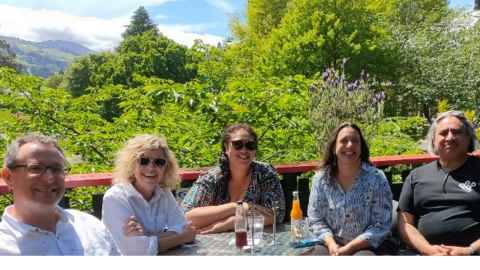COMPASS seminars 2023
Mental health in Pacific Peoples

This presentation shows findings from a joint venture between the Ministry for Pacific Peoples and the Better Start National Science Challenge. Its aim was to explore the characteristics of Pacific Peoples with mental health conditions using data from the New Zealand Health Survey. We adapted an eight-step tivaivai taorei framework that draws on concepts, practices, and values reflected in the making of an indigenous Cook Islands quilt to instil a Pacific perspective into quantitative interpretations.
We highlight significant demographic and socioeconomic associations with anxiety, depression, and psychological distress in Pacific adults, and emotional and behavioural problems in Pacific children. Our findings also reveal the need to improve the representation of Pacific peoples in health surveys. We hope our findings provide insights into realising a healthy, thriving, and resilient population of Pacific peoples of all ages.
Barry Milne is Director of the Centre of Methods and Policy Application in the Social Sciences (COMPASS). He has expertise in using whole population data sets to understand factors that influence health and wellbeing across the life-courses. His background is in the life-course development of mental health, and he led the 'Big Data' theme for the Better Start National Science Challenge.
Kathleen (Ata) Forrest is a Principal Analyst, and Anita van der Veer is a Senior Analyst in the Research and Evaluation team at the Ministry for Pacific Peoples.
Jesse Kokaua is a Statistician and Senior Research Fellow at Va'a o Tautai, the Centre for Pacific Health at the University of Otago, with a particular focus on mental health and education. He is also a member of the Big Data theme for the Better Start National Science Challenge, and has previously worked for the Ministry of Health.
Troy Ruhe is a Research Fellow at Va'a o Tautai, and holds a Health Research Council postdoctoral fellowship, for which he aims to create a tool that will measure the impact of Pacific health research on Pacific communities.
Pathways from social inequality in adolescence to depressed mood in adulthood: A 27-year longitudinal study of a Norwegian cohort

This presentation covers the findings from my three PhD papers (of which one is published and two are about to be submitted). My PhD is conceptually organised around the Adolescent Pathway Model, which postulates that socioeconomic background in adolescence has long-term influences on disparities in adult health through various pathways and mechanisms.
In my papers, I investigate the role of common life transitions, social relations, and health behaviours as pathways shaping disparities in adult depressed mood. To that aim, I use a representative Norwegian data set covering 27 years of age from 13 to 40.
Findings from my studies show substantial inequalities in depressed mood from adolescence to adulthood, while also highlighting the potential of various life transitions to alter depressive trajectories over time. I further find prolonged socioeconomic differences in adolescent health behaviours, as well as increased susceptibility to the effects of low parental closeness on adult depressed mood among families with lower household income during adolescence.
Magnus Jørgensen is a third year PhD student at the University of Bergen in Norway, having graduated with a degree in psychology from Copenhagen University in Denmark. His current research interests are social epidemiology / life course epidemiology and the use of structural equation modelling. Magnus is also currently venturing into Bayesian analyses, and conducting his first systematic review and meta-analysis.